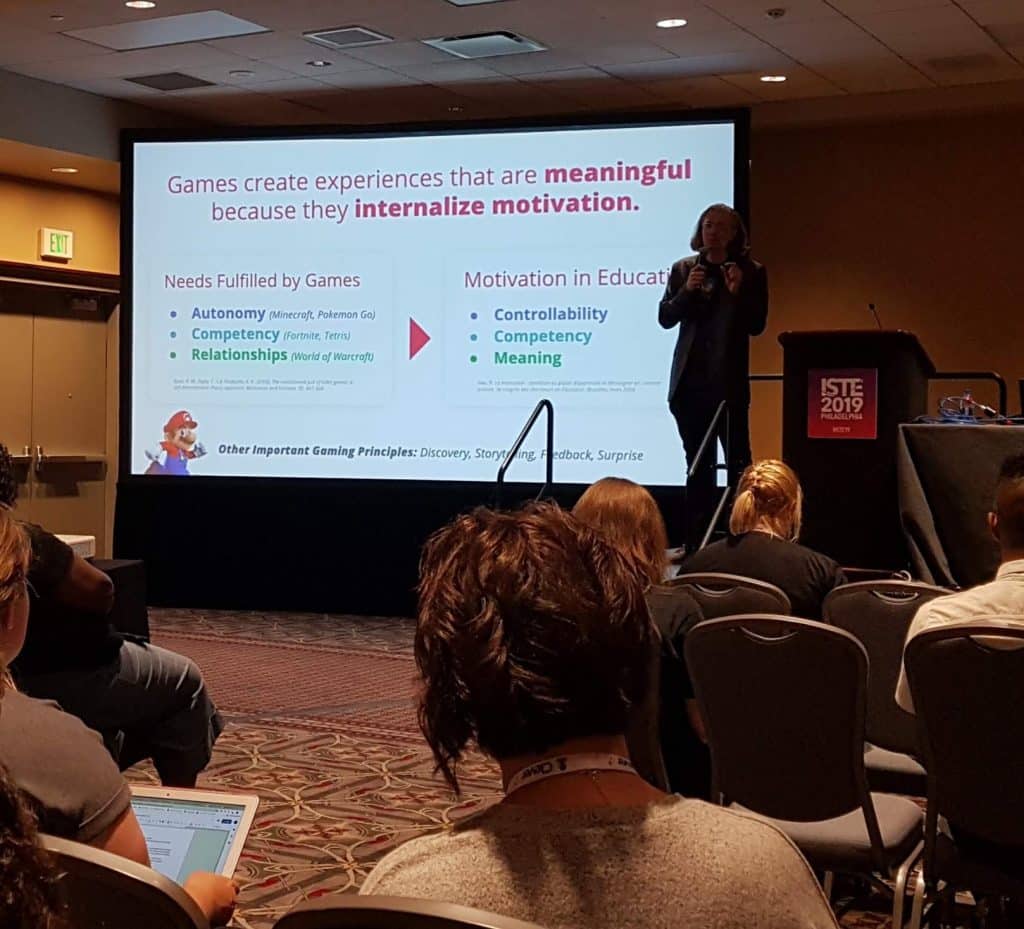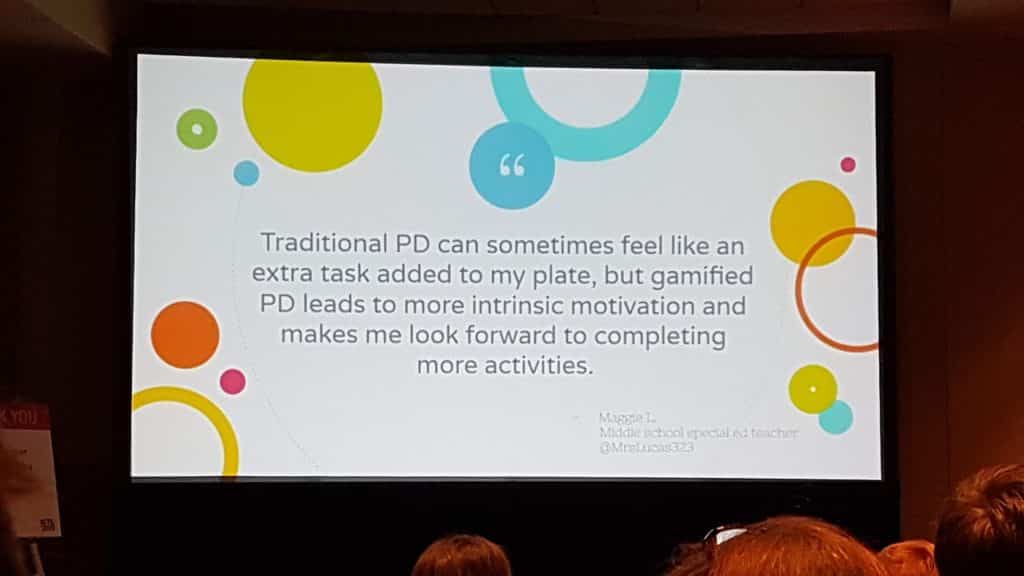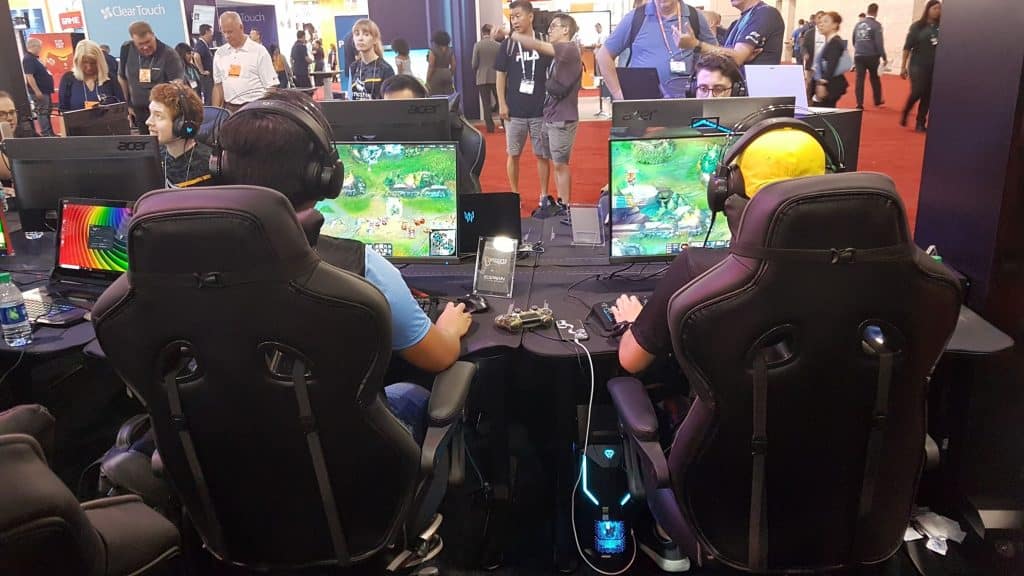Durant mon aventure au congrès de l’International Society for Technology in Education (ISTE), qui se tient cette semaine à Philadelphia (#ISTE2019), je me suis intéressée à la notion de jeu, que ce soit en lien avec la ludification de la gestion de classe, le jeu sérieux, les systèmes de soutien au développement de l’intelligence émotionnelle ou à la ludification du développement professionnel chez les enseignants. Voici quelques notes en lien avec les ateliers auxquels j’ai assisté jusqu’à maintenant.

Le jeu fait partie de la culture des enfants
Apprendre par le jeu, c’est quelque chose qui existe depuis la nuit des temps. Une expérience qui inclut un aspect ludique permet de créer un contexte dont tout le monde veut faire partie. Quelque chose qui permet à chacun de se sentir inclus, engagé. « Le jeu fait partie de la culture des enfants », affirme Devin Young (@youngdevin), président et co-fondateur de Classcraft, après avoir montré une image animée d’un jeune faisant la danse du « floss », élément culturel référant au populaire jeu Fortnite.
Est-il possible d’extraire ces éléments qui fascinent tant les jeunes dans les jeux vidéo et de s’en servir pour favoriser l’apprentissage? Assurément. Il est notamment possible de faire un parallèle entre les besoins psychologiques auxquels les jeux vidéo répondent et les déterminants de la motivation pour l’apprentissage, tel qu’on le voit sur la photo suivante :

Le jeu vidéo comme soutien au développement de l’intelligence émotionnelle
Pour Josh Bound (@josh_bound), fondateur des Video Game Clubs of America, faire une place au jeu vidéo à l’école, par exemple par le biais d’un club parascolaire, est une façon de rejoindre certains jeunes et de favoriser le développement de leurs habiletés sociales et émotives. Il l’a remarqué lorsqu’il a constaté l’intérêt important de son fils autiste pour les jeux vidéo. Grâce à eux, il a trouvé une façon de connecter plus facilement avec lui.
Plus tard, il s’est rendu compte que les jeunes membres du premier club de jeu vidéo qu’il a fondé y participaient non seulement pour jouer, mais aussi pour pouvoir faire partie du groupe. Selon lui, jouer ne devrait plus être tabou car cela permet de rendre des individus socialement maladroits, socialement actif (making the socially awkward, socially active).
L’intelligence émotionnelle, facteur de réussite
L’intelligence émotionnelle serait un grand facteur de réussite, tant au plan personnel que professionnel. Ses piliers, selon le Collaborative for Academic, Social, and Emotional Learning (CASEL), sont les cinq habiletés suivantes :
- La conscience de soi
- La maîtrise de soi
- La motivation
- L’empathie
- La maîtrise des relations humaines.
Ludifier le développement professionnel
Stefanie Crawford (@MrsCford_tweets) avait perdu sa passion de l’enseignement. Elle aimait enseigner, mais toutes les tâches administratives connexes étouffaient ses journées. Heureusement, elle a trouvé sur Twitter une communauté axée sur la ludification de l’éducation. Pour elle, ça a été un déclic. C’est ce qu’elle allait développer comme approche pour rendre ses élèves enthousiastes envers l’école.
Mais ce n’est pas tout : elle a poussé l’idée plus loin et a entraîné tout le personnel de son établissement dans la ludification de leur développement professionnel! Et comment arrive-t-on à faire cela? Elle suggère d’ajouter simplement des éléments venant de l’univers du jeu, tels : la notion de choix (dans les tâches, dans les défis), la compétition (création d’équipes), l’unité (à l’intérieur de l’équipe) et, bien sûr, beaucoup de plaisir.
Pour sa part, elle a créé 4 équipes dans son établissement et a assigné chaque membre du personnel, incluant la direction, à l’une d’elles. Chaque fois que des membres complétaient certaines tâches en lien avec leur développement professionnel, elle les invitait à en inscrire des traces sur un mur Padlet et elle assignait ensuite des points à l’équipe. Passé un certain stade, les équipes pouvaient obtenir des pouvoirs spéciaux et les utiliser pour, entre autres, se « taquiner » entre elles. Cela a permis, du même coup, de resserrer les liens dans l’équipe-école. « Je travaille dans un district où, comme partout, personne ne se parle! », avait-elle expliqué au début de sa présentation.
Voilà une idée qui peut en inspirer bien d’autres!

C’est tout pour aujourd’hui, je vous partage d’autres découvertes bientôt!






 Recevez l'Info #DevProf et l'Hebdo pour ne rien manquer des nouveautés de l'École branchée!
Recevez l'Info #DevProf et l'Hebdo pour ne rien manquer des nouveautés de l'École branchée!




